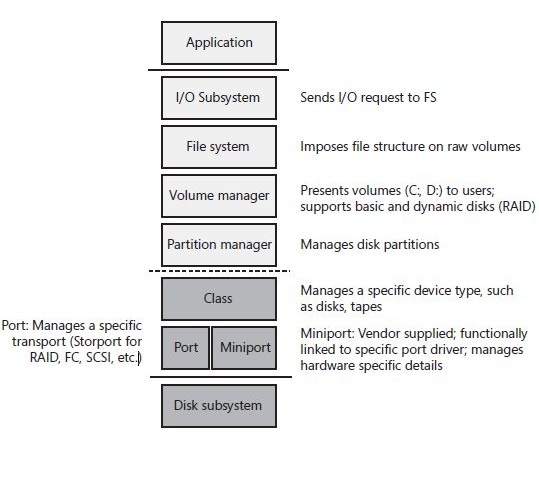Trace: Storport ETW: Unterschied zwischen den Versionen
Admin (Diskussion | Beiträge) |
Admin (Diskussion | Beiträge) |
||
| Zeile 22: | Zeile 22: | ||
=== Save/stop storport trace === | === Save/stop storport trace === | ||
logman stop storport -ets | logman stop storport -ets | ||
| + | |||
== Convert manually storport trace to a readable file (csv) == | == Convert manually storport trace to a readable file (csv) == | ||
Version vom 16. August 2018, 14:11 Uhr
It provides a measure of time delay (latency) for requests made to a system’s disk unit. The measurements are taken form the Storport.sys driver, the lowest Microsoft component in the Storage Stack.
This means It only includes the latency for the components BELOW the Storport driver, normally they only include:
- The Storage Adapter Miniport Driver (Hardware device driver)
- The hardware layers (Storage Controller, Cables, Disk, etc)
Inhaltsverzeichnis
[Verbergen]Prerequisites
- XPerf und Windows Performance Analyzer installed
- Excel installed
- PowerPivot in Excel enabled
Enable PowerPivot in Excel
Here’s how you enable Power Pivot before using it for the first time:
- Go to File > Options > Add-Ins.
- In the Manage box, click COM Add-ins > Go.
- Check the Microsoft Office Power Pivot box, and then click OK.
Create/run storport trace
logman create trace "storport" -ow -o c:\diag\storport.etl -p "Microsoft-Windows-StorPort" 0xffffffffffffffff 0xff -nb 16 16 -bs 1024 -mode Circular -f bincirc -max 4096 -ets
Save/stop storport trace
logman stop storport -ets
Convert manually storport trace to a readable file (csv)
xperf -i storport.ETL -o raw-xperf.csv
Create Excel PowerPivot Table with the readable file (csv)
"Register" the following PowerShell function
Run the PowerShell function
Convert-ETWTraceToReadableFileCSV -RAWXPerfCSVPath C:\StorPortPACMAN\old-raw-xperf.csv
More Informations
Made a Storport Trace with GUI: https://blogs.msdn.microsoft.com/ntdebugging/2010/04/22/storport-etw-logging-to-measure-requests-made-to-a-disk-unit/
How to Look at Storport ETW Trace Logs: https://social.technet.microsoft.com/wiki/contents/articles/11982.how-to-look-at-storport-etw-trace-logs.aspx
Measuring Disk Latency with Windows Performance Monitor (Perfmon): https://blogs.technet.microsoft.com/askcore/2012/02/07/measuring-disk-latency-with-windows-performance-monitor-perfmon/
